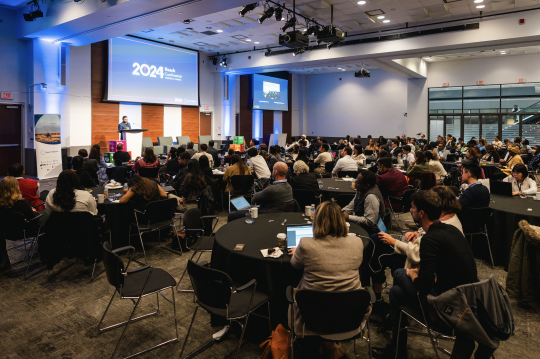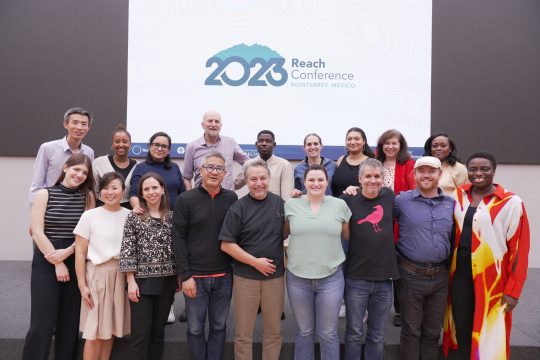News
An opportunity for collaboration: Global Faculty Mentor meeting signals a new phase for the Reach Alliance
Shortly before the holiday break, Reach Alliance faculty mentors logged onto a Zoom meeting for the first Global Faculty Mentor meeting. On the agenda was an opportunity for the group of veteran Reach faculty mentors from the University of Toronto to share their tips and lessons with the new faculty mentors from the University of Oxford, as well as prospective faculty mentors from Tecnológico de Monterrey and University College London.
The meeting marked the first of many gatherings for this group of faculty mentors to collaborate across institutions and is a key development as the Reach Alliance expands its academic partnerships with six select universities around the world.
An early insight at the meeting was the notion of acknowledging one’s own perspective, background and assumptions, and how the awareness of those perspectives allows researchers to bring their own strengths and clarity to the work. “Students may be at the undergraduate or graduate level, and come from different disciplinary backgrounds. As a faculty mentor, I encourage them to reflect on and challenge their own assumptions as they develop research questions,” shared U of T faculty mentor Professor Erica Di Ruggiero of the Dalla Lana School of Public Health.
Over the past five years, Reach, at the University of Toronto, has evolved to include undergraduate and graduate students from backgrounds as varied as law, engineering, medicine and the arts. Each new university partner brings unique knowledge and expertise, and Reach will continue to adapt and grow with the benefit of this rich backdrop of perspectives.
“The Global Faculty Mentor Meeting helped us gain a better understanding of how colleagues at U of T have dealt with the challenges of mentoring Reach projects and how others, who are just joining the Reach Alliance like us, are getting ready to embark on this amazing project,” said Professor Gustavo Merino of Tecnológico de Monterrey’s School of Government and Public Transformation. “The Mentor meetings will create and strengthen a network of faculty members across various leading academic institutions interested in improving ways to reach the hardest to reach, thus opening pathways for greater collaboration on Reach and other projects.”
While the faculty mentors from the U of T had many insights to offer, the purpose of the global faculty mentor meetings is to facilitate shared learning as a means to accelerate the impact of the Reach Alliance. By integrating different perspectives and voices from around the world, Reach will ensure that diversity, reciprocity and collaboration are central to the Alliance.
“The meeting was an exciting step in building Reach’s diverse global network of top university partners, and supports our commitment to strengthen, grow, and sustain local and global partnerships with those committed to our mission,” said Professor Joe Wong, Reach founder, Interim U of T Vice President, International and Roz and Ralph Halbert Professor of Innovation. “We have much to learn from our colleagues at the University of Oxford, Tecnológico de Monterrey and University College London, and this appetite for collaboration will guide Reach as we continue to scale the Reach Alliance around the world.”
What is Reach’s approach to research?
While traditional research is often directed and coordinated by faculty members in academic institutions, Reach employs a student-led, faculty-mentored approach to research.
Student researchers are selected from a diverse range of disciplines and degree programs, but what is common across the cohort is a shared commitment to pursue full achievement of the United Nations’ Sustainable Development Goals by 2030.
That shared commitment is what empowers Reach researchers to take charge of the research process—from setting meeting agendas and refining research questions to conducting key informant interviews and finalizing research deliverables.
“The students need to be in the driver’s seat, both in the substance but also in the management of the project,” Professor Mariana Prado, Reach faculty mentor, shared with the group. “Our role as faculty mentors is to constantly remind the students that they are in charge. This is easier said than done, as our inclination is to step in and help.”
The role of Reach faculty mentors is to be a sounding board for their questions, encourage them to think critically, provide guidance on the research process and reassure students when they feel overwhelmed.
The Reach Alliance is a research network that investigates how to get important stuff to everyone, everywhere – to reach the hardest to reach – in pursuit of achieving the UN Sustainable Development Goals. The student-led, faculty-mentored initiative was founded by Joseph Wong, Interim Vice President, International and Roz and Ralph Halbert Professor of Innovation, and is based at the University of Toronto’s Munk School of Global Affairs & Public Policy. The Reach Alliance is supported by the Mastercard Center for Inclusive Growth.


